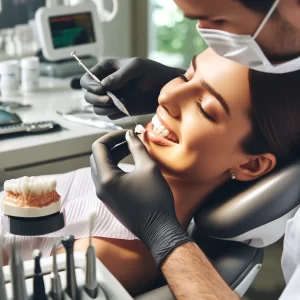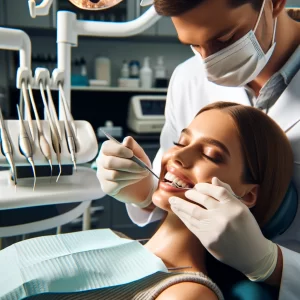Have you ever wondered what materials are used to craft the bright, flawless smiles created by dental veneers? Dental veneers are thin coverings designed to fit over the front surface of teeth, typically made from porcelain or composite resin materials, each offering durability and a natural appearance to enhance one’s smile. These materials are chosen for their ability to mimic the translucency and strength of natural tooth enamel.
Porcelain Veneers: Classic and Durable

Porcelain veneers have long been the standard in cosmetic dentistry for their ability to mimic the natural appearance of tooth enamel. The material is highly prized for its durability and resistance to stains, which contributes to its popularity among those looking to enhance their smile. Porcelain is a type of ceramic that is crafted by combining various types of clay, minerals, and metal oxides, which are then fired at high temperatures to achieve a hard, glass-like finish. This process ensures that porcelain veneers are not only aesthetically pleasing but also robust enough to withstand the daily rigors of chewing and biting.
The composition of porcelain veneers allows them to blend seamlessly with the surrounding teeth, providing a natural look that is virtually indistinguishable from real teeth. For individuals curious about the detailed procedure behind fitting these veneers, How Are Dental Veneers Applied: The Application Process Explained offers an in-depth look at the steps involved. It’s important to understand that the application of porcelain veneers is a meticulous process that requires precision and expertise, ensuring that each veneer is tailored to match the shape, color, and size of the patient’s existing teeth for optimal results.
Composite Resin Veneers: An Overview

Composite resin veneers are a type of dental veneer that is crafted from a tooth-colored resin material. This resin is a blend of organic and inorganic components, primarily consisting of a matrix of synthetic polymers and a filler material that may include glass or other fine particles. These veneers are known for their versatility and are typically applied directly to the tooth surface, where they are sculpted and cured by a dentist to achieve the desired aesthetic. The composite material can be closely matched to the natural color of a patient’s teeth, providing a seamless integration with their smile.
The process of applying composite resin veneers is less invasive than other types of veneers, often requiring minimal alteration to the natural tooth structure. This material is also known for its reparability; if damage occurs, it can usually be fixed without replacing the entire veneer. While composite resin veneers offer certain advantages, their longevity and resistance to staining are generally considered when comparing them to alternative materials used in dental veneers. For those seeking to enhance their smile in Denver, Denver’s Premier Dental Veneers Service may provide further insights into the options available.
Lumineers: A Distinct Veneer Type
Lumineers represent a unique category within the dental veneer family, known for their ultra-thin design that typically requires minimal tooth preparation. Unlike traditional veneers, which are crafted from various materials such as porcelain or composite resin, Lumineers are typically made from a patented cerinate porcelain that is both strong and translucent, closely mimicking the natural appearance of tooth enamel. This distinct type of veneer is an option for individuals looking to enhance their smile, as it aims to provide a balance between durability and aesthetics.
Zirconia Veneers: Strength Meets Aesthetics
Zirconia veneers represent a fusion of durability and visual appeal in the realm of cosmetic dentistry. Crafted from zirconium dioxide, a material known for its exceptional strength and fracture resistance, these veneers are a popular choice for patients seeking to enhance their smile. The composition of zirconia allows for a high degree of customization in terms of shape and color, making it possible to achieve a natural-looking result that complements the individual’s facial features and skin tone. Moreover, zirconia’s ability to mimic the translucency of natural teeth contributes to its aesthetic value, providing a solution that is not only robust but also visually indistinguishable from real tooth enamel. For those interested in exploring the world of cosmetic dental options, Midtown Dental: Esthetic, Restorative, & Implant Dentistry is a practice that can be discovered by visiting this Denver Dentist.
Emax Veneers: Thin Yet Strong
Emax veneers are a popular choice in the realm of dental aesthetics, renowned for their balance of delicacy and durability. Crafted from lithium disilicate glass-ceramic, a material prized for its translucency and strength, these veneers are typically thinner than other types, allowing for a less invasive application process. Despite their slender profile, Emax veneers are remarkably strong, providing a resilient and long-lasting solution for enhancing the appearance of teeth. Their unique composition ensures that they can withstand the daily rigors of biting and chewing while maintaining a natural look that blends seamlessly with the surrounding teeth.
Ceramic Options in Dental Veneers
When considering the array of ceramic options for dental veneers, Emax veneers stand out due to their unique composition. Crafted from lithium disilicate glass-ceramic, Emax veneers are renowned for their blend of durability and aesthetic appeal. Despite being ultra-thin—often compared to the thickness of a contact lens—these veneers provide exceptional strength, which is a significant advantage for patients seeking a long-lasting smile enhancement. The translucency of Emax veneers mimics that of natural tooth enamel, ensuring a seamless integration with your smile. Their robustness and minimal tooth preparation make them a popular choice among both dentists and patients aiming for a perfect balance between resilience and a natural look.
Understanding Feldspathic Veneers
When it comes to the composition of dental veneers, Emax veneers stand out for their unique blend of strength and aesthetics. Crafted from lithium disilicate glass-ceramic, Emax veneers are renowned for their thin yet robust structure, allowing them to mimic the natural translucency of tooth enamel while providing exceptional durability. This material choice is particularly advantageous for patients seeking a minimally invasive option that does not compromise on resilience or appearance. The innovative composition of Emax veneers ensures they can withstand the daily demands of chewing and biting, making them a popular choice among both dentists and patients for creating a flawless smile.
The Role of Glass Ceramics
Among the various materials used for dental veneers, glass ceramics, particularly Emax veneers, stand out for their exceptional balance of durability and aesthetics. Emax veneers are crafted from lithium disilicate glass-ceramic, a material renowned for its thin yet robust structure, allowing for minimal tooth preparation. This innovative composition not only ensures a strong bond to the tooth but also provides a natural translucency that mimics the appearance of real enamel. The strength of Emax veneers is unparalleled, often exceeding that of other ceramic veneers, making them a preferred choice for patients seeking a long-lasting and cosmetically pleasing solution.
Biocompatibility of Veneer Materials
Emax veneers, crafted from lithium disilicate glass-ceramic, are renowned for their exceptional strength and thin profile, allowing for a minimally invasive application that preserves more of the natural tooth structure. This innovative material stands out for its high biocompatibility, meaning it is well-tolerated by the oral tissues, reducing the risk of adverse reactions. The translucency of Emax veneers closely mimics that of natural teeth, providing a superior aesthetic result that is both durable and resistant to wear. Their robust composition ensures longevity and functionality, making Emax an ideal choice for those seeking a blend of cosmetic appeal and oral health.
Conclusion
For further inquiries, please call us at (303) 377-2345 or read our reviews on Google Maps.

